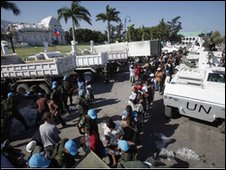 Haiti's government has made the "heartbreaking" decision to declare the search and rescue phase for survivors of the earthquake over, the UN says.
Haiti's government has made the "heartbreaking" decision to declare the search and rescue phase for survivors of the earthquake over, the UN says.
The announcement came a day after two people, an 84-year-old woman and a 21-year-old man, were pulled alive from the rubble in Port-au-Prince.
The UN spokeswoman Elizabeth Byrs says 132 people have been rescued since the earthquake 11 days ago.
On Friday the official government death toll from the quake rose to 110,000.
Speaking in Geneva, Ms Byrs said that the decision to end the rescue operation was "heartbreaking" but that it had been taken on the advice of experts.
She said most search and rescue teams would now be leaving Haiti, although some with heavy lifting equipment may stay to help with the clean-up operation and with aid distribution.
She added that humanitarian relief efforts were still being scaled up in Port-au-Prince, as well as in the towns of Jacmel, Leogane and other areas affected by the earthquake.
The BBC's Adam Mynott, at a university building in Port-au-Prince where many people are feared buried, says there has been some disquiet among Haitians about the decision to end search efforts.
But although two people were pulled out alive in the capital on Friday, it is believed rescue teams have detected no new signs of life under the rubble for the past three days, our correspondent says.
On Friday an 84-year-old woman was found in the wreckage of her home seriously injured and severely dehydrated.
She is being treated by doctors at the main city hospital with intravenous fluids and drugs.
Her son said he had heard her cries on Thursday morning and, almost a day later, he dug her out with the help of friends.
Meanwhile, a 21-year-old man, Emmannuel Buso, was pulled out alive by an Israeli search team and is said to be in a stable condition.
Speaking from his hospital bed he described coming out of the shower when the earthquake hit.
He said he had no food, and drank his own urine to keep thirst at bay.
The head of the Israeli team, Major Amir Ben David, said the rescue had given hope more people could be found alive.
No decision has yet been taken on whether the Israeli team will now go home, the Associated Press news agency reported.
More than 1,000 mourners gathered on Saturday by Port-au-Prince's shattered Roman Catholic Cathedral for the funeral of Haiti's Archbishop Joseph Serge Miot and a vicar, Charles Benoit.
President Rene Preval attended the service, joined by New York Archbishop Timothy Dolan and the Vatican's ambassador to Haiti.
"I came here to pay my respects to all the dead from the earthquake, and to see them have a funeral," mourner Esther Belizair told AP, saying that she had lost a cousin.
Few funeral services have been held in Haiti for those killed by the quake.
At least 75,000 bodies have so far been buried in mass graves, Haiti's government has said. Many more remain uncollected in the streets.
'Most complex operation'
The 20-minute long daily broadcast, called Connexion Haiti, will try to give people up-to-date information about the basic services they need to survive - such as where to find food, clean drinking water, medical assistance and shelter.
An estimated 1.5 million people were left homeless by the 7.0-magnitude quake, which some have estimated has killed as many as 200,000 people.
The UN says 130,000 people have now been relocated out of Port-au-Prince, easing the pressure on overcrowded camps in the city.
Meanwhile the UN agency the World Food Programme says it has increased its food aid to survivors.
Speaking after a two-day evaluation mission to Port-au-Prince, the executive director of WFP, Josette Sheeran, said that on Friday the agency had delivered about 2 million meals.
"This is the most complex operation WFP has ever launched," she said.
"Haiti's entire supply chain infrastructure has been devastated, and we have been faced with launching an operation from scratch."
A benefit concert featuring more than 100 music and Hollywood stars has been broadcast around the world to raise money for the victims of the earthquake.



